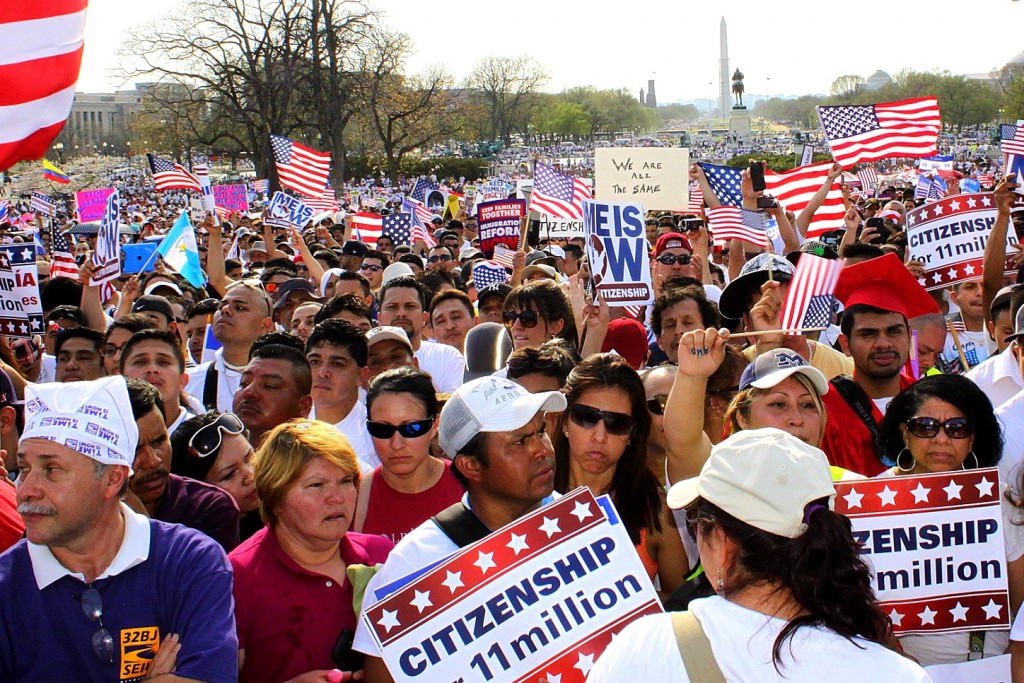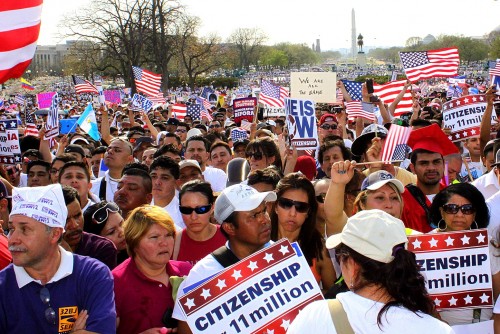Hundreds of thousands of people massed at the Capitol Building on April 10th hoping to make a last-minute plea with lawmakers for a compassionate immigration law that would end deportations and reunite families.
Magdolyn Kawas, a Palestinian immigrant whose father has been deported, was one of the rallyists. So was Juan Carlos Romero from Mexico who, despite two businesses, feels unwelcome in America, and Sara Martinez who sells cosmetics while awaiting her deportation to Ecuador.
“It’s very tough,” said Kawas, a Political Science graduate of Brooklyn College. “My mom had to work for the first time (since my father’s deportation). But before that, she had to learn English.”
The entrepreneurial Romero said he may have established his own businesses, a grocery store and a flower shop in Philadelphia, but still feels like a criminal. “I feel like I am in jail,” he said. “I cannot visit my family in Mexico.”
Like Romero, who is an undocumented immigrant, Sara Martinez said immigration has caused her separation from her husband. She is now living with a common-law-husband from Uruguay with whom she has a daughter named after Hillary Clinton.
“I want my daughter to grow up to be a strong American woman,” she said.
It was a recurring message. The placards, the chants and the shirts called for comprehensive immigration reform that is kind to families. Latino children were seen wearing “Don’t deport my mom” T-shirts, and an elderly Asian man carried a placard that said: “Keep families together.” A law that would shorten family-based petitions, now taking anywhere from 11 to 25 years, is also being eagerly awaited by immigrants.
May Chen, president of the New York State Immigrant Action Fund, said the rally would like to send a message to lawmakers that “we care for immigration reform.” Chen, together with leaders from New York Immigration Coalition and Minkwon Center for Community Action, gathered hundreds of Asian immigrants in six buses that took them to Washington D.C.
At the heart of “real” immigration reform is family unity, she said. About 4.3 million family members are locked in family reunification backlogs. Of that number 1.8 million are Asian immigrants.
Citing reports, she said a U.S. citizen petitioning a brother or sister from the Philippines must wait about 23 years, and 12 years for a family in India under similar circumstances. A married son or daughter from China must wait 11 years for a petition to be approved.
Immigration lawyer Rio Guerrero, who attended the rally, said immigrants from Mexico and other Spanish-speaking countries wait an average of 17 years for family-based petitions.
“And what about aunts, uncles and cousins? Or, at least grandparents?” asked Guerrero, whose parents come from the Philippines. “In many countries, people consider grandparents and other close family members to be a vital part of their immediate family. Unfortunately, U.S immigration laws do not allow for a reasonable path to reunite with these family members.”
Lawmakers, however, avoided specifics when they addressed rallyists outside the Capitol building and those who visited them in small groups.
“We have to get those who are in the shadows into the light, (for them) to have an opportunity to earn their citizenship,” said New Jersey Senator Robert Menendez, who is one of the Gang of 8 lawmakers from both parties who are putting together an immigration bill likely to win approval in Congress.
New York Rep. Jerrold Nadler, who represents the New York City district covering the Upper West Side all the way down to Battery Park, was similarly vague on the much-awaited legislation.
“He said he was not sure when the bill will be introduced, and how, whether it’s a little piece at a time or a whole bill at once,” said Mae Lee, executive director of the Chinese Progressive Association, who was among the rallyists from Chinatown who met with Nadler at his office. “He’s supportive of immigration reform, though.”
However, word is going around that family-based petitions, also known as “chain migration,” may not be addressed in the bill being hammered out by the Gang of 8.
“What we heard is that chain migration may not be on the table,” said Vida Benavides, a Filipino community organizer in Washington D.C. area. It’s time for Congress, she said, to listen to immigrant voices and stories to aid in the making of the bill and for advocates to educate people on the details.
As for Palestinian immigrant Magdolyn Kawas, she is of two minds. She said, “I am sometimes skeptical, but my family is like we’re going to keep fighting till the end. We can’t just give up. I’m just hoping they pass a really good law.”
Check out more photos of the rally on our Tumblr page.
Fi2W is supported by the David and Katherine Moore Family Foundation and the Ralph E. Odgen Foundation.





